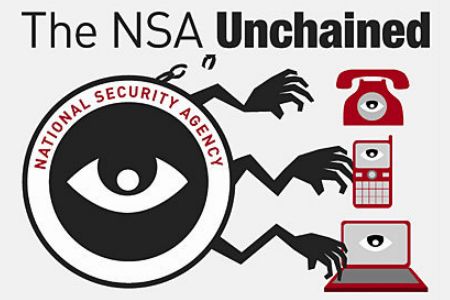94% of Survey Respondents Believe NSA Surveillance of U.S. Citizens Has Either Remained at the Same Level or Increased in the Past Two Years
Thycotic did a field survey of 200 RSA attendees about their thoughts on NSA surveillance since the Edward Snowden affair, Obama’s newly formed Cyber Threat Intelligence Integration Center and the strength of the U.S.’s cyber hacking capabilities relative to those of Russia, North Korea and China.
Thycotic, a provider of smart and effective privileged account management solutions for global organizations, announced the results of a survey of 202 RSA Conference 2015 attendees conducted between April 20th and 21st in San Francisco, which found that 94% of surveyed attendees feel that the NSA’s surveillance of U.S. citizens has increased or remained the same since Edward Snowden leaked classified information from the agency in June 2013. Following widespread calls for increased oversight and information-gathering policy changes in response to what the leak exposed, this data indicates that most security professionals do not believe any steps have been taken to curtail the agency’s activities.
In fact, nearly half (48%) of the respondents believe that the NSA has increased its surveillance of U.S. citizens since Snowden’s revelations, while 45% feel that there has been no change. Just 6% believe that the national exposure of classified NSA documents has led to a decrease in NSA surveillance.
Two-thirds (66%) of respondents believe that Section 215 of the Patriot Act, which allows the NSA to collect bulk records of individuals’ phone calls, should not be renewed once it expires as planned on June 1 of this year. This section of the law has garnered much attention in recent months and was a major pain point for critics of the NSA’s programs as well as the 48% of respondents to Thycotic’s RSA survey in February 2014 who indicated that the NSA had overstepped its boundaries in the surveillance of U.S. citizens.
With regard to cyber threats originating outside of the U.S. however, seven out of 10 (70%) respondents believe that the newly formed Cyber Threat Intelligence Integration Center (CTIIC), which is tasked with producing coordinated cyber threat assessments and sharing that information with relevant government agencies, will have a positive impact on our national security. This indicates an increased confidence in the U.S. government’s ability to combat cyber attacks in the future.
When asked which government has the most sophisticated cyber hacking capabilities, nearly half (49%) of respondents said that the abilities of the United States are superior, indicating a confidence in the country’s offensive capabilities when dealing with cyber threats. Interestingly, thirty-one percent believe that China has the most sophisticated cyber hacking capabilities, followed by Russia (17%) and North Korea (3%).
“While the overwhelming majority of respondents believe that the CTIIC will have a positive impact on national security, this is not the time for organizations of any size to let their guard down, as we’ve seen countless high-profile cyber attacks and data breaches in just the last year,” said Jonathan Cogley, CEO and founder of Thycotic. “As cyber threats increasingly become more sophisticated, organizations should be mindful of both external and insider threats. Privileged account management is still the best way for organizations to ensure that their sensitive data is kept out of the wrong hands.”
About Thycotic
Thycotic IT security and password management solutions empower companies to remove the complexities associated with proper access control and management of privileged accounts. An Inc. 5000 company, Thycotic is trusted by more than 3,000 customers worldwide – including members of the Fortune 500, enterprises, government agencies, technology firms, universities, non-profits and managed service providers. For more information , please visit thycotic.com.
The opinions expressed in this post belongs to the individual contributors and do not necessarily reflect the views of Information Security Buzz.



